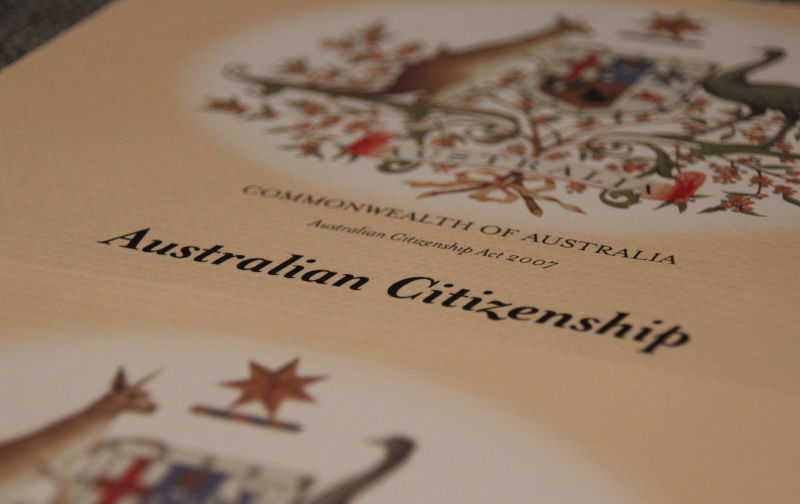The government’s proposed changes to the requirements for Australian citizenship are both poisonous and pointless. They are bad public policy and should be rejected by Parliament.
In the last sitting week of Parliament, the government revealed more details of its proposed changes to the rules for migrants gaining Australian citizenship, including extension of citizenship testing arrangements.
To the uninitiated, the government’s announced changes might at first glance seem reasonable – require migrants to spend more time in Australia to become better integrated before gaining citizenship, encourage them to achieve a better level of English and a have deeper commitment to Australian values.
In practice, the proposed changes are about exclusion and won’t make for a better citizenry. They are both poisonous and pointless.
Under existing citizenship rules, migrants already have to spend four years lawfully in Australia before gaining citizenship. Migrants have always had to have a basic knowledge of English language to qualify as citizens. There has been a formal citizenship test since 2007.
The problem is that the government proposes to ratchet these requirements up to a ridiculous level and throw in a few extra hurdles for good measure. Minister Dutton’s second reading speech neither tells us what the problem is that would be solved by the changes nor what the actual impact would be.
A look at some of the specifics of the legislation throws up disturbing questions and anomalies.
The proposal to move the current residence requirement from four years lawful residence in Australia (one of which must be as a permanent resident) to a requirement for four years as a permanent resident will seriously inconvenience many thousands of perfectly good migrants who expected to become Australian citizens in the near future having met the existing requirement, but now find they have to spend an additional three years in Australia as a permanent resident.
The proposal to replace “basic knowledge of English” with “competent English” and test it with a university level written and oral exam will not do much to improve the English language ability of migrants. People whose English is already at a high-level will pass and those whose English is close to the required level may be able to improve sufficiently to pass. Unfortunately, many migrants, mainly resettled refugees and foreign partners of Australians, will never be able to achieve the required level. They will just be excluded from citizenship. Over time, the numbers will build up to tens and, perhaps hundreds, of thousands of people.
The proposed exemptions from language testing for British, Irish, Americans, Canadians and New Zealanders smack of discrimination in favour of the “Anglosphere” as well as a one-dimensional view of those countries. What if an Australian marries a French Canadian or a non-English-speaking migrant to one of those countries whose English does not measure up to the required “competent” level? After the foreign partner becomes a permanent resident in Australia, will their Anglosphere passport automatically make them a competent English language speaker? Too bad about those hundreds of thousands of migrants from neighbouring Asian countries who speak excellent English: they will still have to do the formal test.
The provisions which would require migrants to demonstrate they have “integrated” would necessarily involve highly subjective and discretionary decision-making. It’s hard to imagine that a fair test could be possibly developed.
The proposal to assess applicants for “conduct which is inconsistent with Australian values” introduces more highly subjective and discretionary decision-making. There is already provision to exclude people from citizenship on criminal and security grounds. If a person’s conduct is not illegal and they have neither been charged nor convicted of a criminal offence, why should it be held against them in the citizenship process?
The proposals envisage limiting the number of times a migrant can do a test. Surely if the government actually believed the test was about gaining a required standard, it would want migrants to keep trying “as long as it takes” to demonstrate that standard.
The government also proposes to substitute the word “allegiance” for the word “commitment” in the title of the Australian Citizenship Pledge of Commitment” and for “loyalty” in the wording of the Pledge itself. There is no evidence that there is a problem with the current wording or that substituting the word “allegiance” will make any difference. A quick scan of the dictionary suggests that the three words all mean the same thing. Perhaps this is a throwback to the old Oath of Allegiance to the Queen.
In a policy sense, the government’s proposals turn the whole inclusive idea of Australian Citizenship since 1949 on its head.
Our highly successful model of Australian citizenship is founded on the idea that Australian society is more cohesive if it has a high rate of Australian citizenship amongst permanent migrants. These are people who are legally entitled to live out the rest of their life in Australia – as workers, parents, taxpayers, neighbours and community members. Citizenship policy has encouraged them to identify with Australia by signing up for citizenship if they reside here, understand what Australian citizenship is about and understand basic English. The current minimum English language requirement is enough to ensure that people can “get by” in Australian society. It reflects the massive range of ages and educational backgrounds involved in our immigration program. Anyone who has been to Australian citizenship ceremonies can see this achievement in practice.
There have been hints by the government that the proposed changes will somehow benefit security, but in practical terms they won’t. All of the people affected by these changes are permanent residents. They can live in Australia for the rest of their life without in any way engaging in the Australian citizenship process. Under the proposed system, many would just choose not to engage with it.
The government’s proposed changes create an atmosphere where migrants, who we have encouraged to come to the country and already screened under our immigration program, must now prove themselves “worthy” if they want Australian citizenship. Making it harder (and in some cases impossible) for permanent residents to become Australian citizens will likely build an alienated group of hundreds of thousands of people who live out their lives here, but can never legally be Australians citizens. Most of these people are likely to be resettled refugees. This can hardly benefit Australian security.
This is truly bad public policy. The legislation deserves rejection by the Parliament.
Peter Hughes, Visitor, School of Demography, Australian National University and formerly Deputy Secretary of the Australian Department of Immigration and Citizenship.
Peter Hughes is a Fellow of the Centre for Policy Development. He had a long career in the Commonwealth Department of Immigration and Citizenship, retiring as Deputy Secretary in 2011. He was awarded the Public Service Medal in 2005 for outstanding public service in the development of policies and programs to increase citizenship, multicultural harmony and the settlement of refugees.


Comments
6 responses to “PETER HUGHES. Citizenship changes: poisonous and pointless”
Experience with migration policy speaks for itself. Well written articlePeter. I agree with Jezza that your submission input would be the invaluable to inform senate enquiry in the context of the Citizenship Bill.
Whatever the Citizenship test, it should be compulsory for all Oz born 18 year olds before they are registered on the Rlectoral Roll and can vote. Level playing field. It woul grow the cohort of the disenfranchised residents and divide society into the ruling elite and the ruled underclass …end of the robust democracy we thought we had
Agreed Peter; excellent summary. Moreover I think that the following statement is an acute observation: “Minister Dutton’s second reading speech neither tells us what the problem is that would be solved by the changes nor what the actual impact would be.” I have no doubt Peter that will remain the case.
I suspect the motivation here is for the Minister to be seen to be doing “something” by those onlookers to whom these considerations seem to be important – that is to say before the Government comes in for any further criticism from, say, One Nation.
Really, why else would you bother with such nonsense ?
Great article! The citizenship bill has been sent for senate inquiry. I hope you would consider making a submission as your input would be extremely valuable. It’s open till 21/7. 🙂
I certainly hope it’s rejected decisively. Its a silly and dangerous, nasty solution to a non existent problem. One Nation will love it – it’s probably aimed at their voters anyway. I say, What next? Different colour armbands?
Class A Fascists in the National Parliament are clearly identifiable by their actions – and by their intent – to demonise those of difference – with ridiculous hurdles! The hardest thing for me to have to listen to in this entire “debate” is the assumption that anyone coming here of non-English speaking refugee or immigrant background would not want to learn English. It is simply ludicrous to assume such a thing – but mostly seems to be “understood” by our largely mono-lingual politicians (not the most representative group of our total 25 million population I think it would be agreed)! I grew up with neighbours who had arrived post-WWII from Europe – who did their best given all the other distractions in their lives (war-trauma as bad as it no doubt was – probably the least of their adjustment troubles) to communicate in English. Their children grew up totally fluent in the language and went on to take up business and public service careers – their children in turn entering all the professions and bringing trade between ancestral lands and this in their wake. I taught English to immigrants and refugees in Sydney for nearly a decade (after doing similarly in Europe) and again – on-arrival people – from village fishing folk to doctors and surgeons and engineers – all strove to conquer enough of English in order to resume careers or to exist in the society – many quite clear that though the services available in their own languages were vital – the newspapers, too – that they wanted to be independently able to exist – not their understanding filtered by their own community spokespeople. So thanks, Peter – for taking this language competency travesty of fascist control – and shaking its tree!
Why don’t we anyway make up a test of our own – and give it to the dark clown PD. And if he fails it – send him to Manus or Nauru for a lengthy indefinite period – and no information (on water/on island offshore matters can be invoked) on his situation. It can be taken as understood that he will be sneaky in trying to contact someone/anyone – to plead his case – but we can pass laws which will bring gaol terms to anyone in any way assisting him – can’t we? It is, after all, the Peter Dutton way!